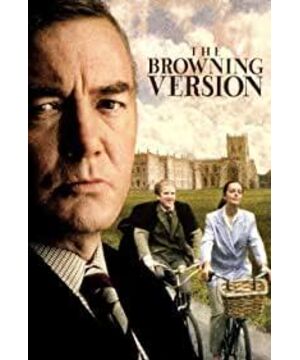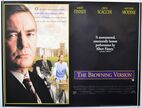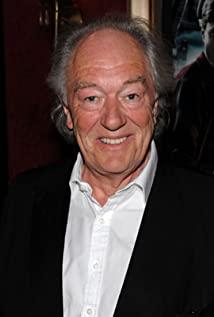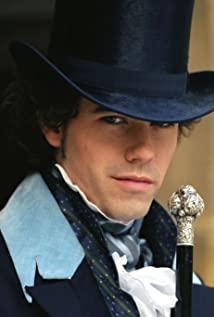Based on Terence Rattigan's novel, this heritage film builds a beautiful and nostalgic scene against the backdrop of classical architecture, sophisticated costumes, inherited regulatory etiquette, and English countryside scenery. world. Of course, the most important thing is Albert Finney's performance, which is still deep and explosive. Albert plays a Greek classics teacher named Andrew Crocker-Harris. Crocker-Harris). He was stern, disciplined, and high-flying, and was dubbed "Hitler" and "Sadistic" by Year 10 students. He has taught Greek classics for 18 years at this noble boarding school, but he can't seem to pass on the joy of learning the classics to his students. The teacher is not liked, and his class is naturally not popular with the students. Now the school has decided to stop teaching classics and instead teach modern languages, such as Italian, French, Spanish, and fired Andrew for his heart problems. It was his last day of teaching at school, and that's where the movie started. Andrew sat alone on the stone bench. The students in front of them asked their favorite baseball star teacher for autographs like chasing stars, and begged the chemistry teacher to take them to do experiments. Love and pursuit have nothing to do with him, and he is indifferent to the excitement. Only the loss belongs to him, and there is helplessness. He couldn't protect what he cherished, and couldn't sow the seeds of interest in classical studies. Classics seemed to have lost its meaning to the current society, and could only watch it decline and die. Andrew is aware of the gap between himself and the students, but he has always been at a high level. He has never taken the initiative to understand what the students are thinking. For 18 years, he has been indoctrinated blindly. When students need his help and guidance, they can only refuse. In his last class, the atmosphere was so depressing that it was suffocating, and the monkey-like students didn't dare to breathe. The way he listened to Taplow's translation with his eyes closed and leaning against the back of his chair when he made up lessons for Taplow, the Chinese audience would definitely smile when he saw it, exactly the same as when Mr. He does not allow Taplow to create or even refute when translating classical texts, only accurate reproduction. But when he was young, didn't he also enjoy the translation creation of self-expression? On the contrary, his own translation and recitation made the students realize what "terror" is. Andrew controls the rhythm of the film, as well as the emotional ups and downs of the audience. For the first 50 minutes or so, he resigned and was pinched like a soft persimmon. The school made excuses to resign him without giving him a pension; the principal let him, a highly qualified teacher, be the first to speak on the stage; his wife Laura cheated on his chemistry teacher behind his back, and hurt him with all kinds of language in life. Depressed, he did not dare to face the problem, and would rather live with a mask. The turning point of this state was facilitated by Taplow. Taplow bought a second-hand book, Agamemnon, translated by Robert Browning, as a farewell gift to Andrew. He also wrote a message in Greek: "God favors those who conquer meekly." This is what Queen Clytemestra said to Agamemnon before he killed him. (The queen killed Agamemnon to avenge her own daughter. In order to appease the anger of the goddess Diana, Agamemnon offered him and the queen's daughter as a sacrifice to her.) Andrew suddenly couldn't help himself after seeing the gift and cried bitterly runny nose. The defensive line in my heart was smashed. He finally took off his mask and began to face the problem. He broke up with Laura firmly; he changed his mind and informed the headmaster on the spot that he insisted on giving his farewell speech in the second. "God favors those who conquer gently." Andrew had an epiphany, and he realized what his problem was, so when he gave his farewell speech, he first put the prepared speech in his pocket, took the initiative to walk down the stage, and walked among the students , sincerely apologize to the students and hope they will forgive: I apologize because I deserve the title of "Hitler in 10th grade". I apologize for failing to do what you have a right to ask a teacher to do: compassion, encouragement, kindness. The noblest human calling is to care for and guide young people, and I am shameful to them. When I first came to the school, I believed that my mission was to teach, I knew what I wanted to do, and I didn't do it. I won't make any excuses for this. I failed, failed miserably. I can only hope that you will find the love in your heart. I hope you and the countless students who have graduated can forgive me that I let you down. I can't forgive myself. Just like that... Albert Finney's emotional manipulations and interpretations are authentic and believable, going straight to the heart of the audience. Whether it is the accumulation of depression in the heart, the release of tears, or the choked apology to the students, they are all interpreted with life. If you compare Al Pacino's confrontation with Principal Charlie in "Scent of a Woman" and Albert Finney's choked apology, one is extroverted and the other delicate and restrained, which one is more What about Yu Yun? The Browning Version was nominated for Best Adapted Screenplay at the 48th BAFTA Awards. The film involves the issue of "student-centered" classical education, which is easy to understand, thanks to its external perspective, the perspective of modern people. Such a perspective can substitute for the audience. But such a perspective is certainly not in Terrence Rattigan's original work. As an authentic upper class nobleman, Terrence Rattigan was deeply influenced by classics, and it was impossible for him to detach himself so thoroughly. This must be the adaptation credit of the film director and screenwriter. Looking at the resumes of the two, screenwriter Ronald Harwood was born in South Africa, while director Mike Figgis was born in Kenya and only returned to the UK at the age of eight. Their "outside perspective" is certainly not unrelated to their origins. The ease of understanding of the film is also reflected in the handling of details, such as the soundtrack. When Andrew was studying in class, he cried bitterly when he got the book and the background music during the farewell speech was very purposeful, very un-British, thanks to Albert Te's acting skills are solid and hold the scene. It is said that the 1951 "Browning Version" is better than the 1994 version. Unfortunately, I can only find the resources of 1994 for the time being, so I can only add the 1951 version to the wish list.
View more about The Browning Version reviews











